University Assignment: HOSP8110 Elements of Law Comparison Report
VerifiedAdded on 2023/01/17
|5
|1385
|83
Report
AI Summary
This report provides a comparative analysis of hospitality law in Canada and India, fulfilling the requirements of HOSP8110 Assignment 4. The study examines key legal aspects, including food safety regulations, specifically the Food Adulteration Act in India and the Food and Drugs Act in Canada, along with the corresponding Food Safety and Standards Act of 2006 in India. It further explores premise and establishment acts, contrasting the Shops and Establishments Act in India with the Alberta Human Rights Act in Canada, focusing on working conditions and human rights within the hospitality sector. The report highlights the similarities and differences in the implementation and application of these laws, offering a comprehensive overview of the legal frameworks governing the hospitality industry in both countries. The conclusion emphasizes the importance of standardized services and regulations, despite their varied implementation across different nations, to ensure guest and host protection.
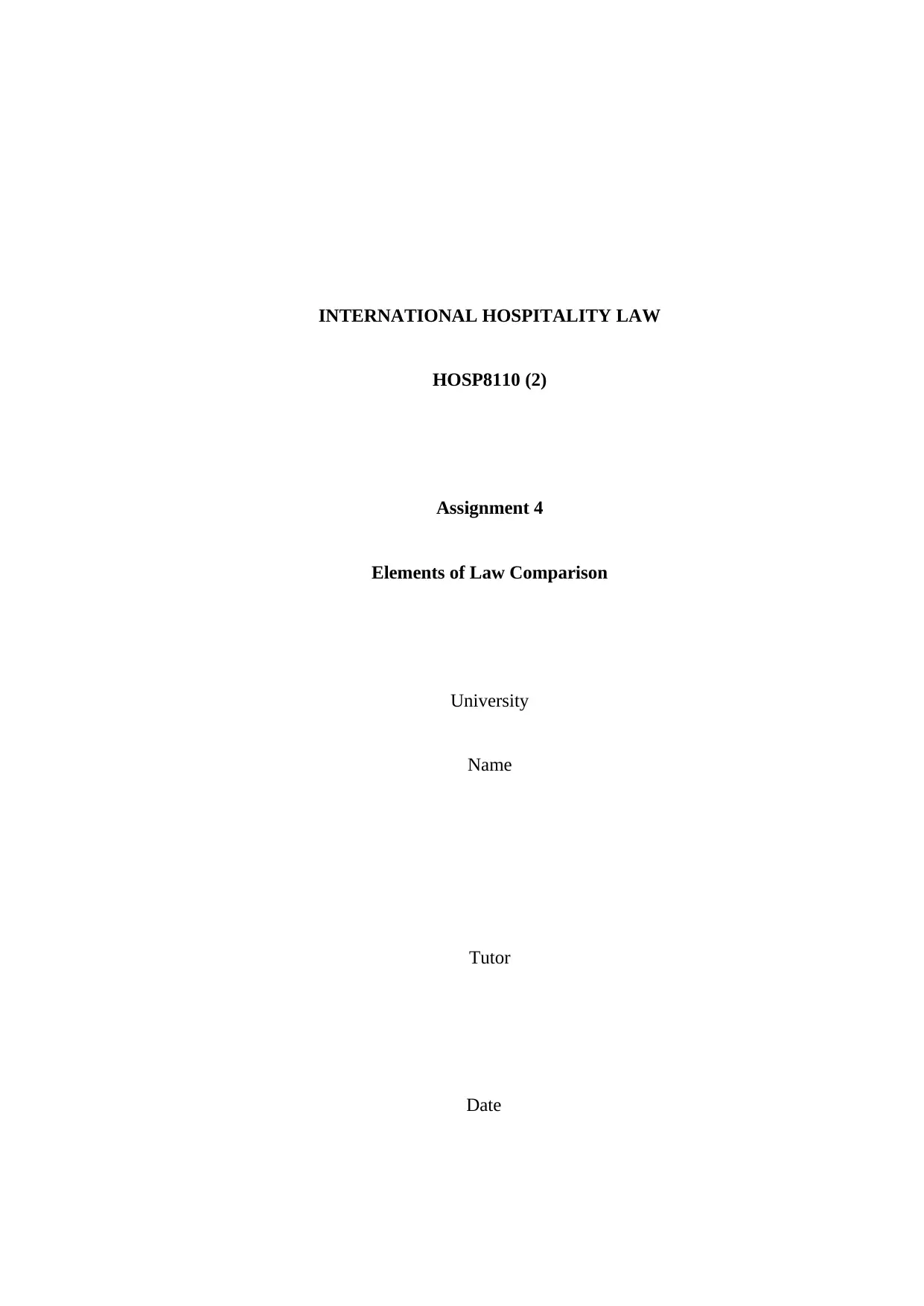
INTERNATIONAL HOSPITALITY LAW
HOSP8110 (2)
Assignment 4
Elements of Law Comparison
University
Name
Tutor
Date
HOSP8110 (2)
Assignment 4
Elements of Law Comparison
University
Name
Tutor
Date
Paraphrase This Document
Need a fresh take? Get an instant paraphrase of this document with our AI Paraphraser
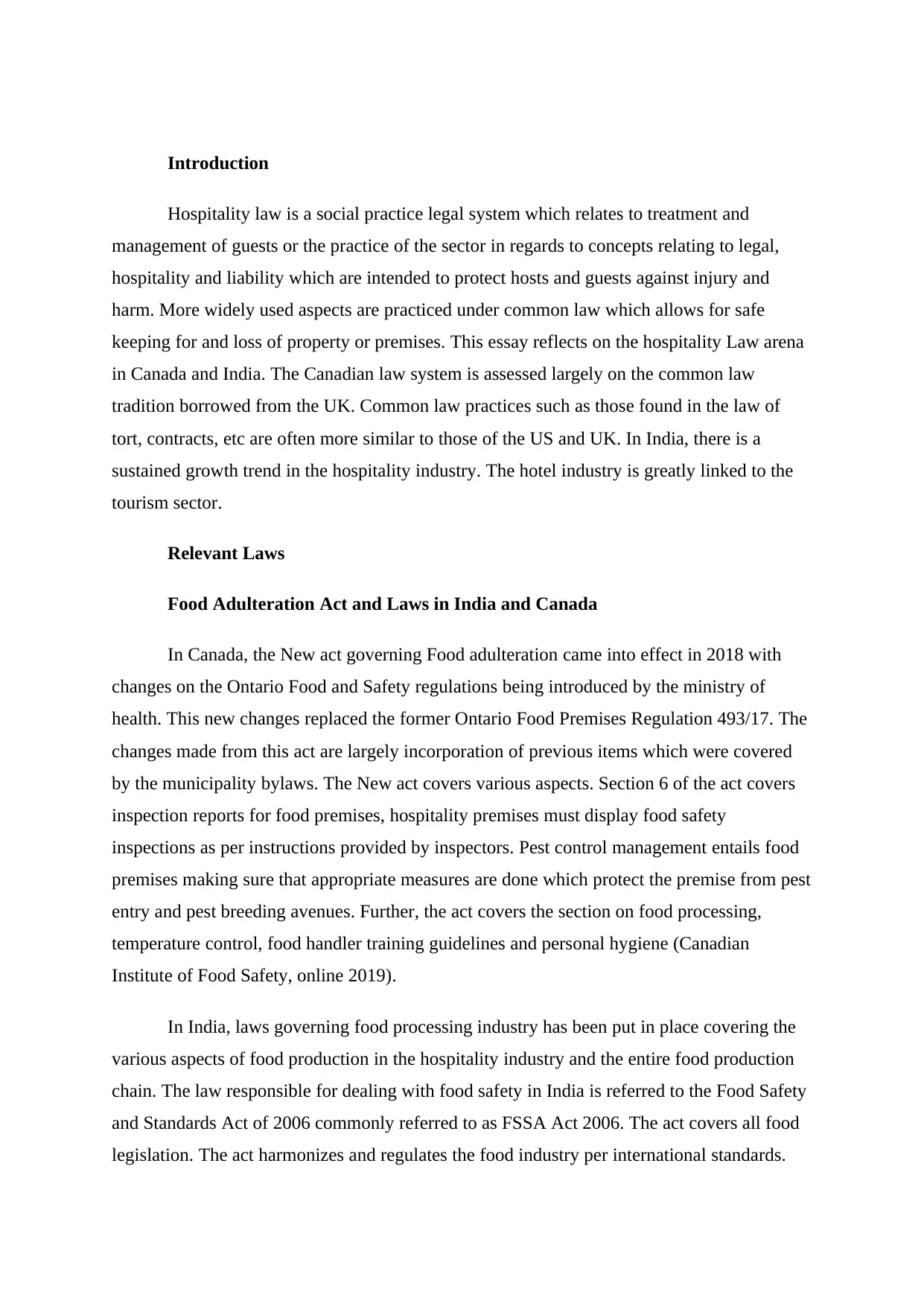
Introduction
Hospitality law is a social practice legal system which relates to treatment and
management of guests or the practice of the sector in regards to concepts relating to legal,
hospitality and liability which are intended to protect hosts and guests against injury and
harm. More widely used aspects are practiced under common law which allows for safe
keeping for and loss of property or premises. This essay reflects on the hospitality Law arena
in Canada and India. The Canadian law system is assessed largely on the common law
tradition borrowed from the UK. Common law practices such as those found in the law of
tort, contracts, etc are often more similar to those of the US and UK. In India, there is a
sustained growth trend in the hospitality industry. The hotel industry is greatly linked to the
tourism sector.
Relevant Laws
Food Adulteration Act and Laws in India and Canada
In Canada, the New act governing Food adulteration came into effect in 2018 with
changes on the Ontario Food and Safety regulations being introduced by the ministry of
health. This new changes replaced the former Ontario Food Premises Regulation 493/17. The
changes made from this act are largely incorporation of previous items which were covered
by the municipality bylaws. The New act covers various aspects. Section 6 of the act covers
inspection reports for food premises, hospitality premises must display food safety
inspections as per instructions provided by inspectors. Pest control management entails food
premises making sure that appropriate measures are done which protect the premise from pest
entry and pest breeding avenues. Further, the act covers the section on food processing,
temperature control, food handler training guidelines and personal hygiene (Canadian
Institute of Food Safety, online 2019).
In India, laws governing food processing industry has been put in place covering the
various aspects of food production in the hospitality industry and the entire food production
chain. The law responsible for dealing with food safety in India is referred to the Food Safety
and Standards Act of 2006 commonly referred to as FSSA Act 2006. The act covers all food
legislation. The act harmonizes and regulates the food industry per international standards.
Hospitality law is a social practice legal system which relates to treatment and
management of guests or the practice of the sector in regards to concepts relating to legal,
hospitality and liability which are intended to protect hosts and guests against injury and
harm. More widely used aspects are practiced under common law which allows for safe
keeping for and loss of property or premises. This essay reflects on the hospitality Law arena
in Canada and India. The Canadian law system is assessed largely on the common law
tradition borrowed from the UK. Common law practices such as those found in the law of
tort, contracts, etc are often more similar to those of the US and UK. In India, there is a
sustained growth trend in the hospitality industry. The hotel industry is greatly linked to the
tourism sector.
Relevant Laws
Food Adulteration Act and Laws in India and Canada
In Canada, the New act governing Food adulteration came into effect in 2018 with
changes on the Ontario Food and Safety regulations being introduced by the ministry of
health. This new changes replaced the former Ontario Food Premises Regulation 493/17. The
changes made from this act are largely incorporation of previous items which were covered
by the municipality bylaws. The New act covers various aspects. Section 6 of the act covers
inspection reports for food premises, hospitality premises must display food safety
inspections as per instructions provided by inspectors. Pest control management entails food
premises making sure that appropriate measures are done which protect the premise from pest
entry and pest breeding avenues. Further, the act covers the section on food processing,
temperature control, food handler training guidelines and personal hygiene (Canadian
Institute of Food Safety, online 2019).
In India, laws governing food processing industry has been put in place covering the
various aspects of food production in the hospitality industry and the entire food production
chain. The law responsible for dealing with food safety in India is referred to the Food Safety
and Standards Act of 2006 commonly referred to as FSSA Act 2006. The act covers all food
legislation. The act harmonizes and regulates the food industry per international standards.
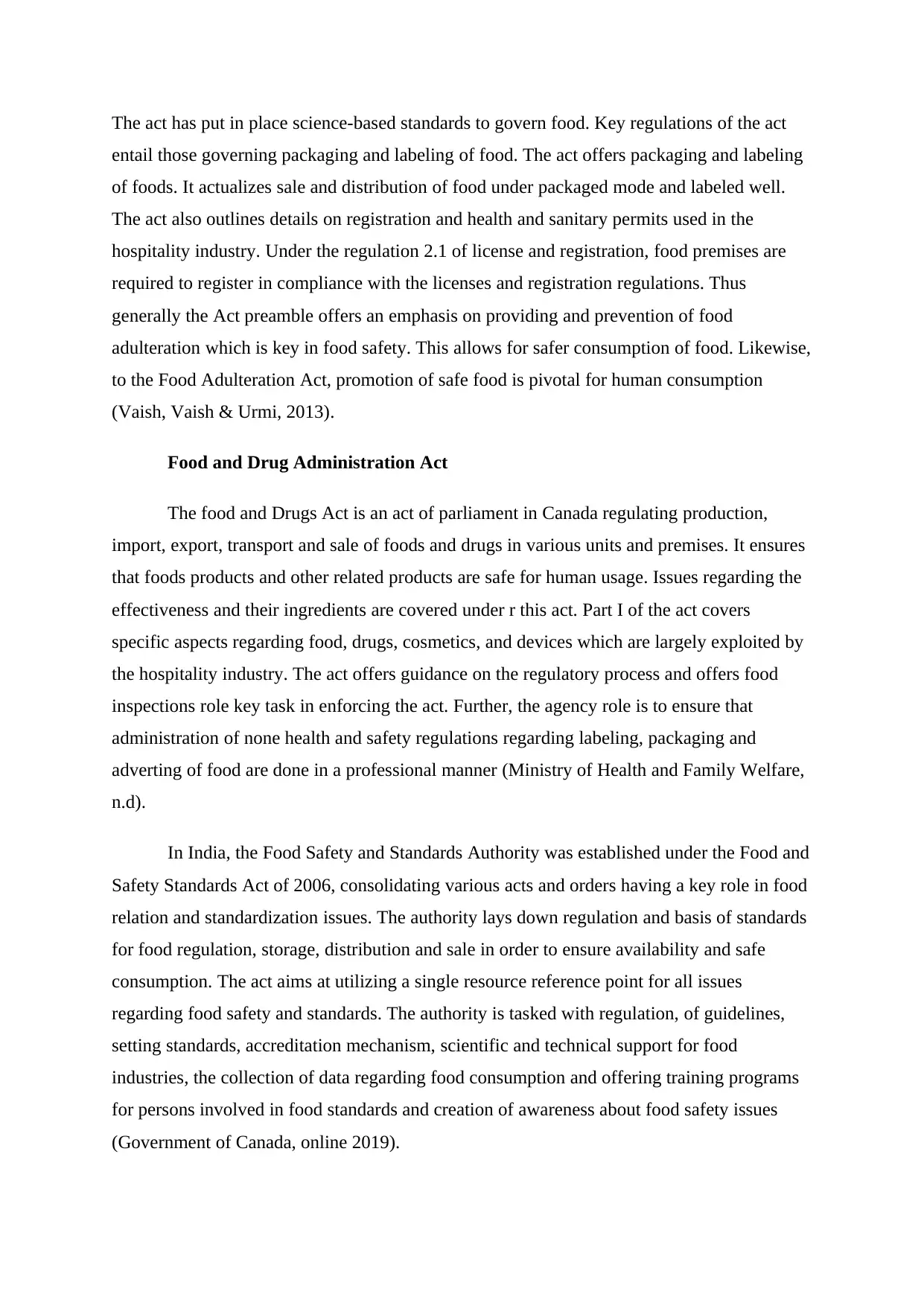
The act has put in place science-based standards to govern food. Key regulations of the act
entail those governing packaging and labeling of food. The act offers packaging and labeling
of foods. It actualizes sale and distribution of food under packaged mode and labeled well.
The act also outlines details on registration and health and sanitary permits used in the
hospitality industry. Under the regulation 2.1 of license and registration, food premises are
required to register in compliance with the licenses and registration regulations. Thus
generally the Act preamble offers an emphasis on providing and prevention of food
adulteration which is key in food safety. This allows for safer consumption of food. Likewise,
to the Food Adulteration Act, promotion of safe food is pivotal for human consumption
(Vaish, Vaish & Urmi, 2013).
Food and Drug Administration Act
The food and Drugs Act is an act of parliament in Canada regulating production,
import, export, transport and sale of foods and drugs in various units and premises. It ensures
that foods products and other related products are safe for human usage. Issues regarding the
effectiveness and their ingredients are covered under r this act. Part I of the act covers
specific aspects regarding food, drugs, cosmetics, and devices which are largely exploited by
the hospitality industry. The act offers guidance on the regulatory process and offers food
inspections role key task in enforcing the act. Further, the agency role is to ensure that
administration of none health and safety regulations regarding labeling, packaging and
adverting of food are done in a professional manner (Ministry of Health and Family Welfare,
n.d).
In India, the Food Safety and Standards Authority was established under the Food and
Safety Standards Act of 2006, consolidating various acts and orders having a key role in food
relation and standardization issues. The authority lays down regulation and basis of standards
for food regulation, storage, distribution and sale in order to ensure availability and safe
consumption. The act aims at utilizing a single resource reference point for all issues
regarding food safety and standards. The authority is tasked with regulation, of guidelines,
setting standards, accreditation mechanism, scientific and technical support for food
industries, the collection of data regarding food consumption and offering training programs
for persons involved in food standards and creation of awareness about food safety issues
(Government of Canada, online 2019).
entail those governing packaging and labeling of food. The act offers packaging and labeling
of foods. It actualizes sale and distribution of food under packaged mode and labeled well.
The act also outlines details on registration and health and sanitary permits used in the
hospitality industry. Under the regulation 2.1 of license and registration, food premises are
required to register in compliance with the licenses and registration regulations. Thus
generally the Act preamble offers an emphasis on providing and prevention of food
adulteration which is key in food safety. This allows for safer consumption of food. Likewise,
to the Food Adulteration Act, promotion of safe food is pivotal for human consumption
(Vaish, Vaish & Urmi, 2013).
Food and Drug Administration Act
The food and Drugs Act is an act of parliament in Canada regulating production,
import, export, transport and sale of foods and drugs in various units and premises. It ensures
that foods products and other related products are safe for human usage. Issues regarding the
effectiveness and their ingredients are covered under r this act. Part I of the act covers
specific aspects regarding food, drugs, cosmetics, and devices which are largely exploited by
the hospitality industry. The act offers guidance on the regulatory process and offers food
inspections role key task in enforcing the act. Further, the agency role is to ensure that
administration of none health and safety regulations regarding labeling, packaging and
adverting of food are done in a professional manner (Ministry of Health and Family Welfare,
n.d).
In India, the Food Safety and Standards Authority was established under the Food and
Safety Standards Act of 2006, consolidating various acts and orders having a key role in food
relation and standardization issues. The authority lays down regulation and basis of standards
for food regulation, storage, distribution and sale in order to ensure availability and safe
consumption. The act aims at utilizing a single resource reference point for all issues
regarding food safety and standards. The authority is tasked with regulation, of guidelines,
setting standards, accreditation mechanism, scientific and technical support for food
industries, the collection of data regarding food consumption and offering training programs
for persons involved in food standards and creation of awareness about food safety issues
(Government of Canada, online 2019).
⊘ This is a preview!⊘
Do you want full access?
Subscribe today to unlock all pages.

Trusted by 1+ million students worldwide
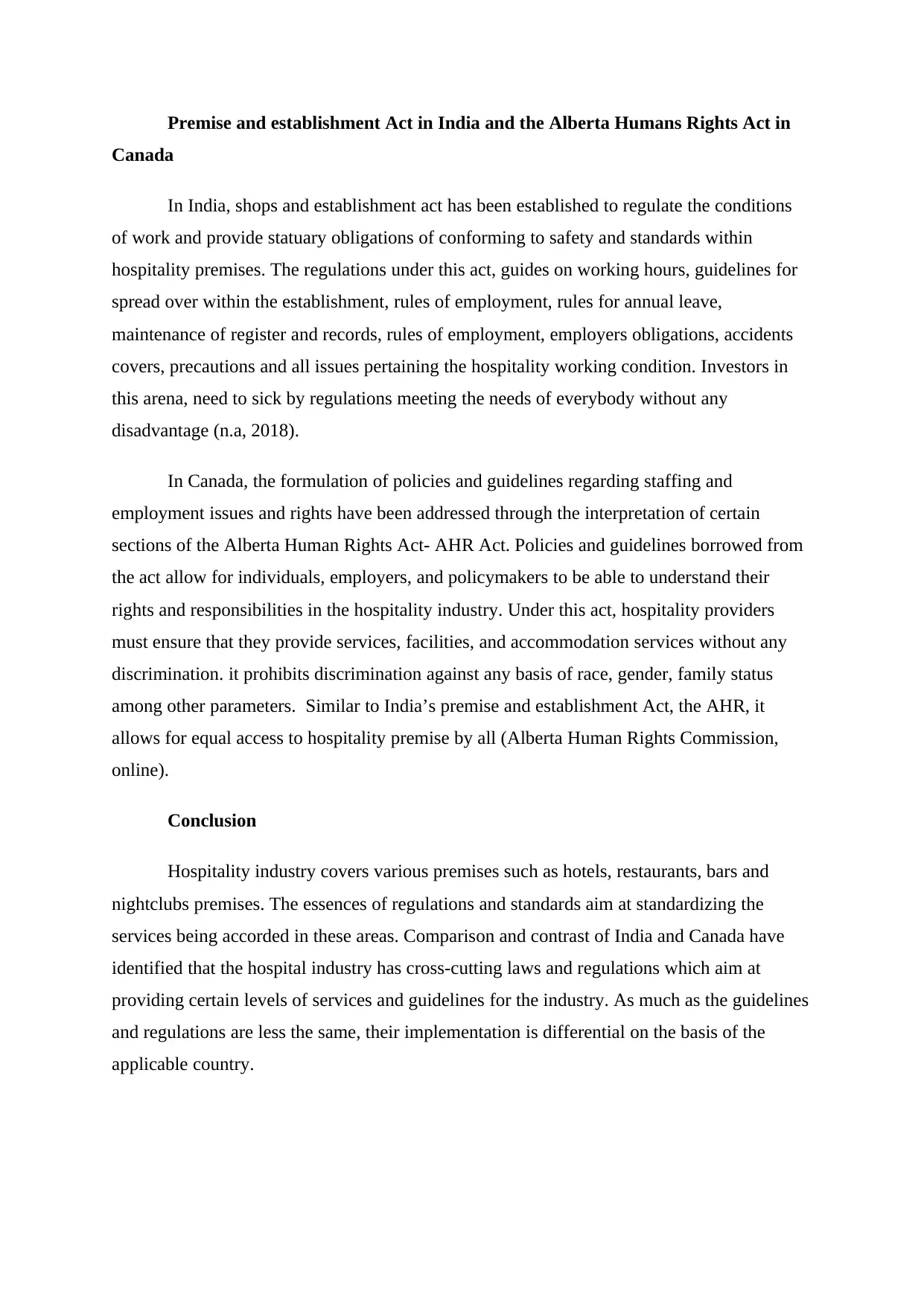
Premise and establishment Act in India and the Alberta Humans Rights Act in
Canada
In India, shops and establishment act has been established to regulate the conditions
of work and provide statuary obligations of conforming to safety and standards within
hospitality premises. The regulations under this act, guides on working hours, guidelines for
spread over within the establishment, rules of employment, rules for annual leave,
maintenance of register and records, rules of employment, employers obligations, accidents
covers, precautions and all issues pertaining the hospitality working condition. Investors in
this arena, need to sick by regulations meeting the needs of everybody without any
disadvantage (n.a, 2018).
In Canada, the formulation of policies and guidelines regarding staffing and
employment issues and rights have been addressed through the interpretation of certain
sections of the Alberta Human Rights Act- AHR Act. Policies and guidelines borrowed from
the act allow for individuals, employers, and policymakers to be able to understand their
rights and responsibilities in the hospitality industry. Under this act, hospitality providers
must ensure that they provide services, facilities, and accommodation services without any
discrimination. it prohibits discrimination against any basis of race, gender, family status
among other parameters. Similar to India’s premise and establishment Act, the AHR, it
allows for equal access to hospitality premise by all (Alberta Human Rights Commission,
online).
Conclusion
Hospitality industry covers various premises such as hotels, restaurants, bars and
nightclubs premises. The essences of regulations and standards aim at standardizing the
services being accorded in these areas. Comparison and contrast of India and Canada have
identified that the hospital industry has cross-cutting laws and regulations which aim at
providing certain levels of services and guidelines for the industry. As much as the guidelines
and regulations are less the same, their implementation is differential on the basis of the
applicable country.
Canada
In India, shops and establishment act has been established to regulate the conditions
of work and provide statuary obligations of conforming to safety and standards within
hospitality premises. The regulations under this act, guides on working hours, guidelines for
spread over within the establishment, rules of employment, rules for annual leave,
maintenance of register and records, rules of employment, employers obligations, accidents
covers, precautions and all issues pertaining the hospitality working condition. Investors in
this arena, need to sick by regulations meeting the needs of everybody without any
disadvantage (n.a, 2018).
In Canada, the formulation of policies and guidelines regarding staffing and
employment issues and rights have been addressed through the interpretation of certain
sections of the Alberta Human Rights Act- AHR Act. Policies and guidelines borrowed from
the act allow for individuals, employers, and policymakers to be able to understand their
rights and responsibilities in the hospitality industry. Under this act, hospitality providers
must ensure that they provide services, facilities, and accommodation services without any
discrimination. it prohibits discrimination against any basis of race, gender, family status
among other parameters. Similar to India’s premise and establishment Act, the AHR, it
allows for equal access to hospitality premise by all (Alberta Human Rights Commission,
online).
Conclusion
Hospitality industry covers various premises such as hotels, restaurants, bars and
nightclubs premises. The essences of regulations and standards aim at standardizing the
services being accorded in these areas. Comparison and contrast of India and Canada have
identified that the hospital industry has cross-cutting laws and regulations which aim at
providing certain levels of services and guidelines for the industry. As much as the guidelines
and regulations are less the same, their implementation is differential on the basis of the
applicable country.
Paraphrase This Document
Need a fresh take? Get an instant paraphrase of this document with our AI Paraphraser
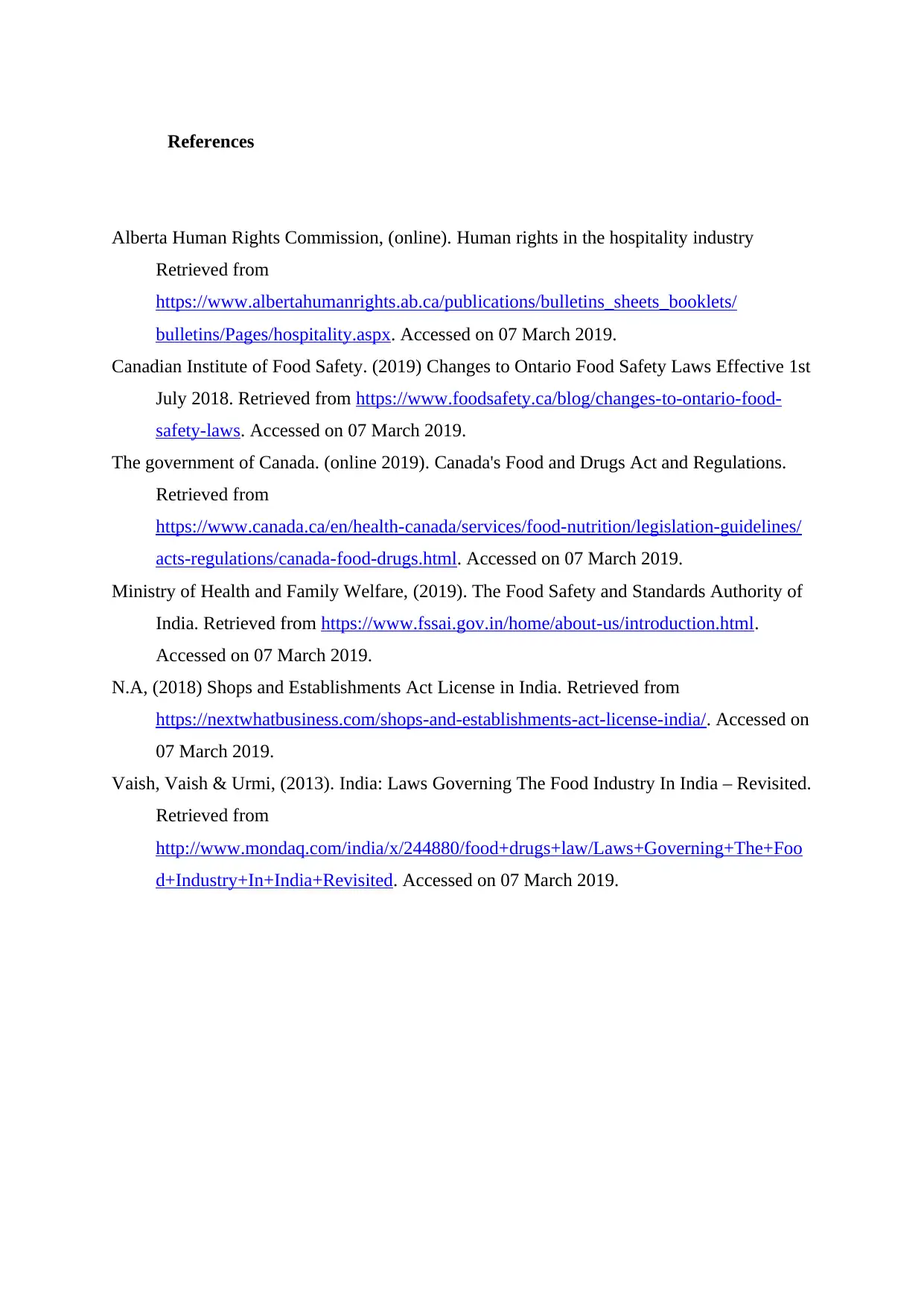
References
Alberta Human Rights Commission, (online). Human rights in the hospitality industry
Retrieved from
https://www.albertahumanrights.ab.ca/publications/bulletins_sheets_booklets/
bulletins/Pages/hospitality.aspx. Accessed on 07 March 2019.
Canadian Institute of Food Safety. (2019) Changes to Ontario Food Safety Laws Effective 1st
July 2018. Retrieved from https://www.foodsafety.ca/blog/changes-to-ontario-food-
safety-laws. Accessed on 07 March 2019.
The government of Canada. (online 2019). Canada's Food and Drugs Act and Regulations.
Retrieved from
https://www.canada.ca/en/health-canada/services/food-nutrition/legislation-guidelines/
acts-regulations/canada-food-drugs.html. Accessed on 07 March 2019.
Ministry of Health and Family Welfare, (2019). The Food Safety and Standards Authority of
India. Retrieved from https://www.fssai.gov.in/home/about-us/introduction.html.
Accessed on 07 March 2019.
N.A, (2018) Shops and Establishments Act License in India. Retrieved from
https://nextwhatbusiness.com/shops-and-establishments-act-license-india/. Accessed on
07 March 2019.
Vaish, Vaish & Urmi, (2013). India: Laws Governing The Food Industry In India – Revisited.
Retrieved from
http://www.mondaq.com/india/x/244880/food+drugs+law/Laws+Governing+The+Foo
d+Industry+In+India+Revisited. Accessed on 07 March 2019.
Alberta Human Rights Commission, (online). Human rights in the hospitality industry
Retrieved from
https://www.albertahumanrights.ab.ca/publications/bulletins_sheets_booklets/
bulletins/Pages/hospitality.aspx. Accessed on 07 March 2019.
Canadian Institute of Food Safety. (2019) Changes to Ontario Food Safety Laws Effective 1st
July 2018. Retrieved from https://www.foodsafety.ca/blog/changes-to-ontario-food-
safety-laws. Accessed on 07 March 2019.
The government of Canada. (online 2019). Canada's Food and Drugs Act and Regulations.
Retrieved from
https://www.canada.ca/en/health-canada/services/food-nutrition/legislation-guidelines/
acts-regulations/canada-food-drugs.html. Accessed on 07 March 2019.
Ministry of Health and Family Welfare, (2019). The Food Safety and Standards Authority of
India. Retrieved from https://www.fssai.gov.in/home/about-us/introduction.html.
Accessed on 07 March 2019.
N.A, (2018) Shops and Establishments Act License in India. Retrieved from
https://nextwhatbusiness.com/shops-and-establishments-act-license-india/. Accessed on
07 March 2019.
Vaish, Vaish & Urmi, (2013). India: Laws Governing The Food Industry In India – Revisited.
Retrieved from
http://www.mondaq.com/india/x/244880/food+drugs+law/Laws+Governing+The+Foo
d+Industry+In+India+Revisited. Accessed on 07 March 2019.
1 out of 5
Related Documents
Your All-in-One AI-Powered Toolkit for Academic Success.
+13062052269
info@desklib.com
Available 24*7 on WhatsApp / Email
![[object Object]](/_next/static/media/star-bottom.7253800d.svg)
Unlock your academic potential
Copyright © 2020–2026 A2Z Services. All Rights Reserved. Developed and managed by ZUCOL.





